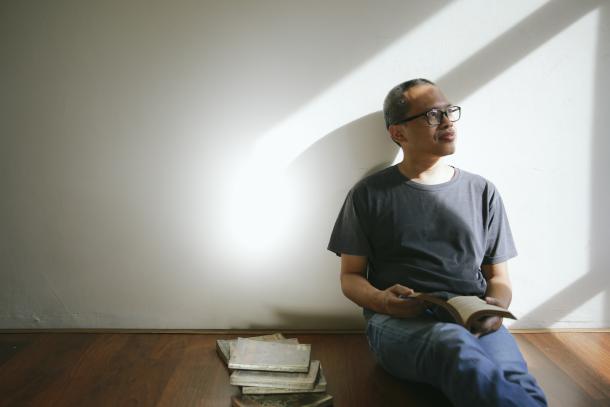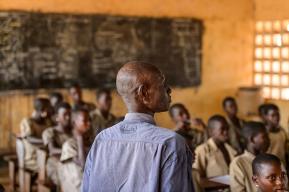Idea
Eka Kurniawan: “It would be great to live around people who read literature from across the world”

Interview by Agnès Bardon, UNESCO
You grew up in a village in Java, an island in the southwest of Indonesia. How did you develop an interest in literature? What kind of reader were you?
I lived with my maternal grandparents in a very remote village until I was ten years old. They were farmers, working mostly in paddy fields. I knew nothing about literature back then, but there was an old woman, a close relative of my grandmother, who used to tell weird and magical stories in our veranda to entertain children. I think that was the first time I became really interested in stories, and how people tell them. Later, I also got very into drama programmes on the radio.
My introduction to literature, in book form, took place when I moved to stay with my parents in Pangandaran, a small town on the coast of Java. I was in primary school and as a new kid in our neighbourhood, I had no friends. Luckily, there was a small 'library', a 1 by 1 metre kiosk near a bus station that lent cheap novels. I read a lot of horror and martial arts novels, sometimes crime and romance. Many of these were actually for adults, but the library owner didn’t care too much about my age. Even at that time, I started trying to write my own stories.
Where do you write?
I can write anywhere, as long as people let me write and don’t talk to me. In my early days as a writer, I used to write my short stories at my parents' house, in the kitchen. My first novel was written in a rented room in Yogyakarta. I moved to Jakarta in 2003 and started writing my second novel by hand in a lined notebook while I was waiting to have lunch with my girlfriend. Nowadays I write my stuff at home, but sometimes I go to a coffee shop nearby and write there (as I am right now, answering these questions while waiting to pick up my daughter from school).
You are also a journalist. How did the novel become the means through which you describe the world?
I was a journalist for a very short time, yes. I learned journalism at a university magazine, and then I was asked to write for another magazine wishing to publish long pieces we called 'literary journalism'. I read books in the same genre, such as Hiroshima by John Hersey and In Cold Blood by Truman Capote. Even if I’ve been influenced by a lot of different sources, I’ve learned a lot from journalism. Particularly how to construct events as elements of stories. However, I stopped working as a journalist when the magazine ceased publication. I found a new job in a film production company, and I got back into writing novels and short stories in my free time. I think that the novel is a perfect form to describe a world, allowing me to construct stories with a mixed realistic approach – like in journalism – and a fantastical (sometimes weird) approach, influenced by cheap novels I read when I was a teenager, or the folktales the old woman used to tell when I was a kid.
The novel is a perfect form to describe a world
Your first language is Sundanese but you write in Indonesian. What connection do you maintain to this language?
Actually, I almost never write in Sundanese (although I can write and read in it). Sundanese is the spoken language I use with my family, or some of my neighbours. Like many Indonesians in my generation, I started using Indonesian as early as in first grade in primary school since it’s the official language in schools and offices. So, for me, Indonesian is a written language from the very beginning, and therefore I didn’t have to convert my thinking when I started writing. Moreover, in Pangandaran, where I grew up, several languages are spoken: Sundanese and Javanese. This made me familiar with the two languages, along with Indonesian, which sometimes serves as a bridge between people who don’t understand either of the languages. As a writer, I sometimes borrow words or grammatical constructions from Sundanese (and Javanese) in case it works better in a sentence. In any case, it’s my privilege to be able to do it.
Since the publication of your first novel, Beauty Is a Wound, your stories, which combine the magical and the bizarre, grace and dread, have often been compared to the magical realism of Gabriel García Márquez. Do you recognize yourself in this comparison?
I can understand the comparison. I read a lot of García Márquez’s works when I was a university student, as well as other Latin American writers. In the late 1990s, there was plenty of interest in anything Latin American, particularly for political reasons. Students made comparisons between Suharto and military dictators from Latin America, the influence of religious leaders (Catholic and Islamic) in society, mystical cultures and poverty. There was so much similarity that we could read García Márquez or any other Latin American writer as if their works were situated in a tropical province in Indonesia!
We could read García Márquez as if his works were situated in a tropical province in Indonesia!

In your second novel, Man Tiger, the main character, who brutally murders another person, blames his actions on the tiger that exists within him. Does this represent the animal within us? What is the role of myths in your writing?
In fact, it was not intended to be a psychological, Freudian story. But of course people can read it that way. To be honest, I wrote it as if it were real. In Indonesia, many people believe in such phenomena. Like I said earlier, I grew up with weird stories and mystical beliefs. However, I don’t want my stories to be just mystical or fantastical. Although they have mystical elements, I want them to represent the world we live in, the problems and the politics we deal with, that is, the power of games. The mystical elements may seem familiar to my readers, which – I hope – make them curious, but also open the door to symbolism. For these reasons, the reader can consider the tiger in the novel as a symbol too.
You want to share your love of world literature to fellow Indonesians through Moooi Pustaka, an independent publishing house which translates foreign titles from their original languages into Indonesian. What motivates you to do this?
In recent years, my books have been published in many languages in a lot of countries, notably with small populations – some smaller than the city of Jakarta, which has more than ten million inhabitants. Sometimes I wonder where this interest in my books comes from, me being a writer from a far away place, with a very different culture and even a different climate. I’m very jealous. It would be great, I think, to live around people who read literature from around the world. Whenever I travel, I visit local bookstores and every time I’m amazed by the diversity of translated books published.
Sometimes I wonder where this interest in my books comes from, me being a writer from a far away place
This made me realize that I wanted to see the same diversity in Indonesia. Some editors have already done this job, and still do, but there are still a lot of interesting works to translate. Another issue is that a lot of books are translated from English, no matter what the original language is. For me, this creates a bias since publishers from the US and the UK filter what kind of literature can be read. I think there needs to be an effort made to translate directly from the original, even if the work is not popular in English-speaking countries.
I talked with some of my friends about the possibility of creating a small publishing house focused on world literature. Recently, we made it happen.
More from OUR GUESTS










